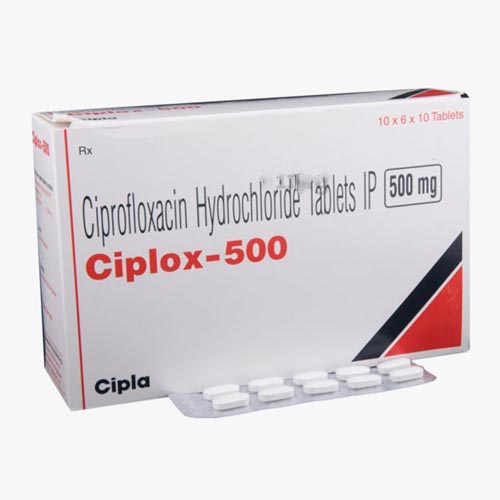Description
Ciprofloxacin is a broad-spectrum antimicrobial carboxyfluoroquinoline.
The bactericidal action of ciprofloxacin results from inhibition of the enzymes topoisomerase II (DNA gyrase) and topoisomerase IV, which are required for bacterial DNA replication, transcription, repair, strand supercoiling repair, and recombination.
Ciprofloxacin is used for the treatment of the following infections caused by susceptible organisms: urinary tract infections, acute uncomplicated cystitis, chronic bacterial prostatitis, lower respiratory tract infections, acute sinusitis, skin and skin structure infections, bone and joint infections, complicated intra-abdominal infections (used in combination with metronidazole), infectious diarrhea, typhoid fever (enteric fever), uncomplicated cervical and urethral gonorrhea, and inhalational anthrax (post-exposure).
Pharmacodynamics
Ciprofloxacin is a broad-spectrum antiinfective agent of the fluoroquinolone class. Ciprofloxacin has in vitro activity against a wide range of gram-negative and gram-positive microorganisms.
The mechanism of action of quinolones, including ciprofloxacin, is different from that of other antimicrobial agents such as beta-lactams, macrolides, tetracyclines, or aminoglycosides; therefore, organisms resistant to these drugs may be susceptible to ciprofloxacin.
There is no known cross-resistance between ciprofloxacin and other classes of antimicrobials. Notably the drug has 100 times higher affinity for bacterial DNA gyrase than for mammalian.
Mechanism of action
The bactericidal action of ciprofloxacin results from inhibition of the enzymes topoisomerase II (DNA gyrase) and topoisomerase IV, which are required for bacterial DNA replication, transcription, repair, strand supercoiling repair, and recombination.
Side effects
All medicines may cause side effects, but many people have no, or minor, side effects.Some medical conditions may interact with Ciprofloxacin.
Tell your doctor or pharmacist if you have any medical conditions.
Common ciprofloxacin side effects may include: nausea, vomiting, diarrhea, stomach pain, vaginal itching or discharge, headache or abnormal liver function tests.
This is not a complete list of all side effects that may occur. If you have questions about side effects, contact your health care provider.


zoritoler imol –
I went over this website and I believe you have a lot of good info , saved to bookmarks (:.